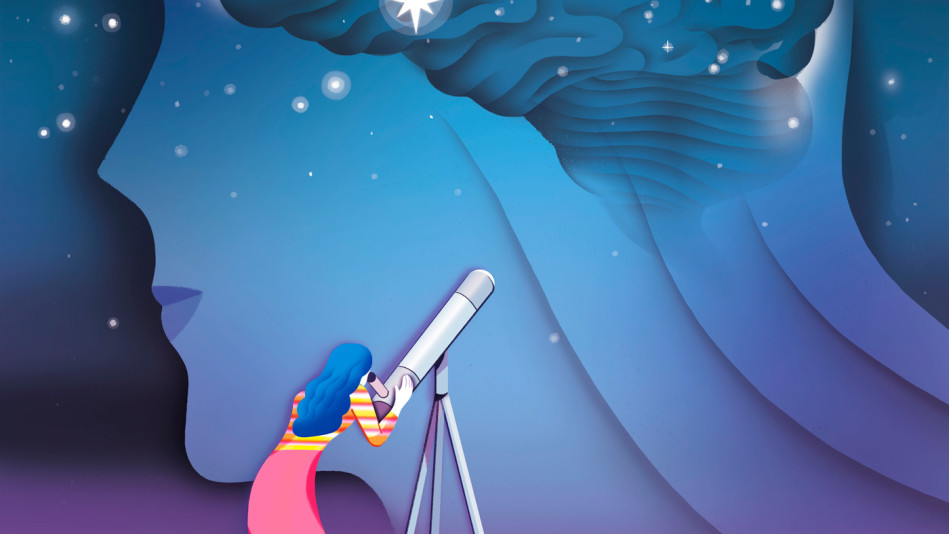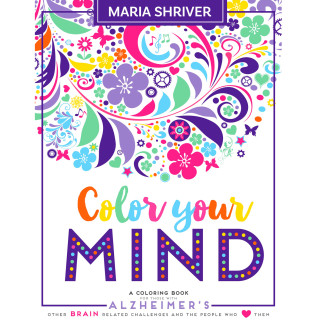Maria Shriver's Urgent Message to Women About Alzheimer's
Maria Shriver has an urgent message for women of all ages.

Illustration: Rebekka Dunlap
Journalist and activist Maria Shriver has been promoting Alzheimer's awareness since her father, Sargent Shriver, was diagnosed in 2003. She wrote a children's book to help kids understand what's happening to grandparents who have the disease, executive-produced an HBO documentary series on the topic, and testified to Congress in support of the National Alzheimer's Project Act to coordinate our country's approach to research, treatment, and caregiving. Along the way, Shriver realized something. "Women kept talking to me about their mothers having Alzheimer's," she says. No one could tell her whether women were indeed disproportionately affected by the disease. So Shriver dug deeper, and in 2010, she released The Shriver Report: A Woman's Nation Takes on Alzheimer's, which revealed the epidemic's effect on women—not only as patients, but also as caregivers. As the founder of the nonprofit Women's Alzheimer's Movement (WAM), Shriver hopes to get all women fired up about the state of their brains. We asked her what mothers, sisters, daughters, and granddaughters can do right now.
O: Why do we need a movement?
Maria Shriver: Every 66 seconds, another brain develops Alzheimer's, and almost two-thirds of them belong to women—but no one knows why. That's something every woman should be determined to figure out.
O: Hasn't the idea of a disparity often been explained away by the fact that women tend to live longer than men?
MS: Yes, but now we know that other things are going on as well. Alzheimer's researchers are looking into sex hormones and the X chromosome, as well as depression, stress, and inflammation—and how all of these things affect women differently. Part of WAM's mission is to encourage scientists to conduct gender-based research and to help fund their work. We're not sufficiently aware of how health issues especially relevant to women—certain medications, pregnancy, perimenopause, lack of sleep—affect our brains.
O: And why should younger women care?
MS: Because Alzheimer's can be developing for decades, and there are things women can do today—at 30, 40, 50—that might hold it back.
O: So there is room for optimism?
MS: Yes! Alzheimer's is viewed as scary, depressing, and hopeless, whereas I'm trying to shine a light on reasons to be hopeful and excited. We're on the brink of learning how to age well—physically, mentally, and spiritually.
O: The National Institutes of Health will spend over $6 billion this year researching cancer, $3 billion on HIV/AIDS, over $1.3 billion on heart disease—and $910 million on Alzheimer's. Is this fair?
MS: Like the others, this disease deserves billions of dollars for research. I'm hoping to galvanize an army of women to start demanding that funds be raised on a federal level.
O: What are the chances of getting Washington on board?
MS: Plenty of people in government are dealing with dementia in their families, and politicians on both sides of the aisle are interested in Alzheimer's. I'm trying to get to President Trump to convince him that this could be his moon shot.
O: How does your family's experience with Alzheimer's affect how you talk about the issue?
MS: My father was one of the most brilliant people on the planet. When someone like that begins to repeat himself, lose things, and act differently, at first you say "Well, he's getting older" or "He's just distracted." I'm trying to educate people: When you notice things changing, you must act.
O: This month you're partnering with Equinox Sports Clubs to raise money for research through the Move for Minds crowdfunding event .
MS: It's taken a lot of guts on the part of Equinox, because they're a sexy brand, and people don't like to talk about Alzheimer's. But I realized that everyone who goes into an Equinox gym is thinking about their bodies, so I said, “Help me to get them thinking about their brains, too.” I want women to realize that they spend all this time and money on their lips, their thighs, and their eyes, but none of that will matter if you don't have your mind.
Arts and Chat

"I created this coloring book to be a shared activity for people with Alzheimer's or other forms of dementia and their caregivers—like my father and me. It's beautiful, it's packed with information on brain health, and a portion of the proceeds will go to the Women's Alzheimer's Movement."
—Maria Shriver
Get the book
O: Why do we need a movement?
Maria Shriver: Every 66 seconds, another brain develops Alzheimer's, and almost two-thirds of them belong to women—but no one knows why. That's something every woman should be determined to figure out.
O: Hasn't the idea of a disparity often been explained away by the fact that women tend to live longer than men?
MS: Yes, but now we know that other things are going on as well. Alzheimer's researchers are looking into sex hormones and the X chromosome, as well as depression, stress, and inflammation—and how all of these things affect women differently. Part of WAM's mission is to encourage scientists to conduct gender-based research and to help fund their work. We're not sufficiently aware of how health issues especially relevant to women—certain medications, pregnancy, perimenopause, lack of sleep—affect our brains.
O: And why should younger women care?
MS: Because Alzheimer's can be developing for decades, and there are things women can do today—at 30, 40, 50—that might hold it back.
O: So there is room for optimism?
MS: Yes! Alzheimer's is viewed as scary, depressing, and hopeless, whereas I'm trying to shine a light on reasons to be hopeful and excited. We're on the brink of learning how to age well—physically, mentally, and spiritually.
O: The National Institutes of Health will spend over $6 billion this year researching cancer, $3 billion on HIV/AIDS, over $1.3 billion on heart disease—and $910 million on Alzheimer's. Is this fair?
MS: Like the others, this disease deserves billions of dollars for research. I'm hoping to galvanize an army of women to start demanding that funds be raised on a federal level.
O: What are the chances of getting Washington on board?
MS: Plenty of people in government are dealing with dementia in their families, and politicians on both sides of the aisle are interested in Alzheimer's. I'm trying to get to President Trump to convince him that this could be his moon shot.
O: How does your family's experience with Alzheimer's affect how you talk about the issue?
MS: My father was one of the most brilliant people on the planet. When someone like that begins to repeat himself, lose things, and act differently, at first you say "Well, he's getting older" or "He's just distracted." I'm trying to educate people: When you notice things changing, you must act.
O: This month you're partnering with Equinox Sports Clubs to raise money for research through the Move for Minds crowdfunding event .
MS: It's taken a lot of guts on the part of Equinox, because they're a sexy brand, and people don't like to talk about Alzheimer's. But I realized that everyone who goes into an Equinox gym is thinking about their bodies, so I said, “Help me to get them thinking about their brains, too.” I want women to realize that they spend all this time and money on their lips, their thighs, and their eyes, but none of that will matter if you don't have your mind.
Arts and Chat

"I created this coloring book to be a shared activity for people with Alzheimer's or other forms of dementia and their caregivers—like my father and me. It's beautiful, it's packed with information on brain health, and a portion of the proceeds will go to the Women's Alzheimer's Movement."
—Maria Shriver
Get the book



